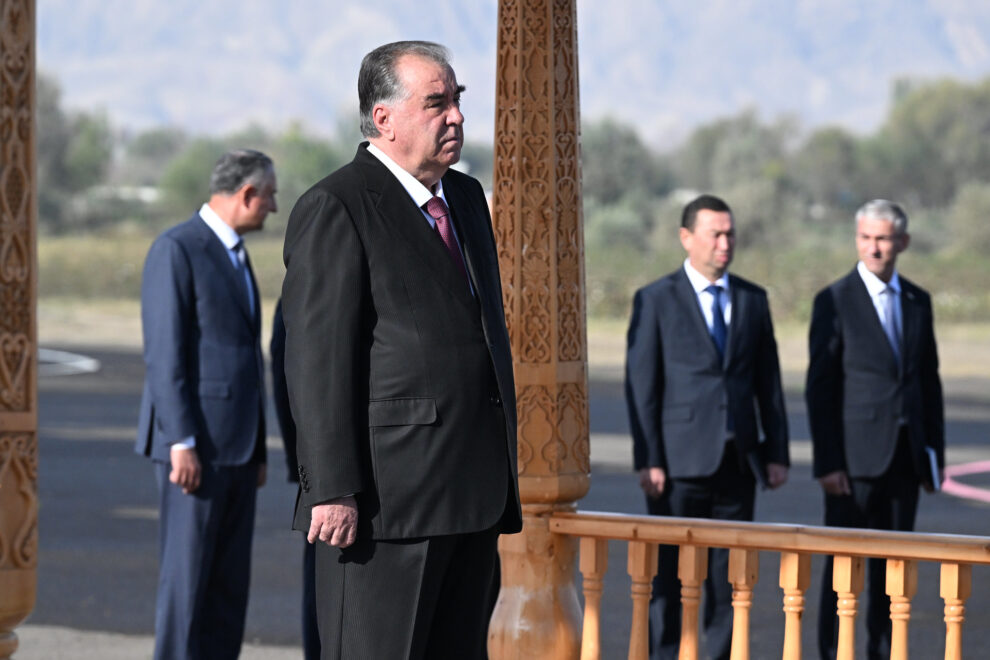Infighting over the succession and growing frustration in the regions could shatter the stability that the Tajik president has been building for so many years.
Next year will mark thirty years of Emomali Rahmon’s presidency in Tajikistan, now the only country in Central Asia that has not seen a change of leadership since the early 1990s. Unsurprisingly, there have been rumors of an imminent transition of power for a decade.
The name of the successor is no secret: it’s Rahmon’s son, thirty-six-year-old Rustam Emomali. But there is no consensus within the president’s large family over the succession. Some of the president’s other children have their own ambitions to run the country, which could upset plans for the transition.
President Rahmon is seventy-one years old, and has reportedly suffered numerous health issues. Arrangements for the transition have long been in place, but events keep getting in the way of its implementation: first the pandemic and its economic fallout, and then the street protests in neighboring Kazakhstan in January 2022, which frightened the Tajik leader and persuaded him it was not a good time to step down. Even Turkmenistan has seen a power transition in recent years. Now Tajikistan is expected to implement its own in 2024.
Rustam has already headed a number of government agencies. Since 2017, he has been mayor of Dushanbe: a post he has combined since 2020 with that of speaker of the upper house of parliament, to whom power would automatically pass if the current president were to step down early.
His supporters argue that as the capital’s mayor, he has improved the city, supported youth initiatives, and started to form his own team of young technocrats. Some are counting on him to carry out at least limited reforms once he is in power, such as those seen in neighboring Uzbekistan and Kazakhstan.
Not everyone believes Rustam is ready to take over, however. The future president is an unknown quantity for most Tajiks. All of his public appearances are prerecorded and accompanied by information read out by the broadcaster, meaning that people have not even heard him speak. His nickname on social media is “the great mute.”
More worryingly, the heir apparent has reportedly shot and wounded two people: his own uncle in 2008, and—just last year—the head of the State Committee for National Security, Saimumin Yatimov, supposedly for refusing to carry out orders.
There are those within the presidential family who do not want to see Rustam succeed his father because they fear losing prestigious posts in government and business. They are indignant that there are no relatives within the team he is building. The current president cannot possibly keep everyone happy, and this could threaten the transition, as ambitious clan members prepare to battle it out for the top job in order to retain their privileges.
Rahmon has seven daughters and two sons. The most ambitious of them is generally considered to be the second daughter Ozoda, who has headed up the presidential administration since 2016. She is very experienced, works well with her staff, and has the trust of the security services. Unsurprisingly, given the alleged shooting incident, there is no love lost between Rustam and the country’s main security official Yatimov, who has reportedly been paving the way for Ozoda’s candidacy. In addition, her husband Jamoliddin Nuraliev is also considered a very influential figure, having been deputy chair of the country’s central bank for over seven years.
Another contender for the presidency could be Rahmon’s fifth daughter, Ruhshona, a seasoned diplomat who is well versed in Tajikistan’s political affairs. Her husband is the influential oligarch Shamsullo Sohibov, who made his fortune thanks to his family connection to the president. Together with his brothers, he controls entire sectors of the economy, including transport, media, and banking. Change at the top could deprive the Sohibov clan of both influence and money, so Ruhshona and her husband may well throw their hats into the ring.
They might get the backing of Rahmon’s other children, who also control various sectors of the economy, including air travel (the third daughter, Tahmina) and pharmacies (the fourth daughter, Parvina). There are also plenty of Rahmon’s more distant relatives who owe their fortunes to the president and fear losing their positions under his successor.
Rahmon has relied on the loyalty of various relatives to ensure the stable functioning of his regime. But overly vociferous squabbles within the family could destabilize the situation, and for precisely this reason, Rahmon has tried to temper their ambition. Ruhshona, for example, was sent to the UK as Tajik ambassador to stop her from interfering in the plans for the transition. Her oligarch husband went with her.
Nor is the heir apparent himself outside the fray. There is evidence that Rustam was involved in leaking information to the media about his sister Ozoda’s alleged affair with her driver: something that, in patriarchal Tajikistan, caused serious damage to her reputation. There are also rumors that Ozoda’s main ally Yatimov will be retired from his post as head of the security services and replaced with a close friend of Rustam, Shohruh Saidov.
Right now, international circumstances are conducive to a swift transition. Tajikistan’s relations with its trickiest neighbors, Afghanistan and Kyrgyzstan, are improving. While the Taliban has yet to be recognized as the legitimate Afghan government by Dushanbe, both sides agreed to strengthen economic ties during the first visit to Tajikistan by a delegation from the radical Islamist movement in March this year. Meanwhile, the Tajik government has pledged to resolve the border dispute with Kyrgyzstan—an issue that has led to several armed clashes in the last three years—by spring 2024. Rahmon is clearly trying to hand over a stable country to his son.
The situation at home, however, is more complicated. There is also considerable opposition to Rustam’s candidacy among the regional elites, who have long supported Rahmon in exchange for access to state resources, and are now seeing many of the most lucrative cash flows appropriated by the presidential family. A transition of power could be an opportune moment to express their displeasure.
Events in Gorno-Badakhshan in spring 2022 were a stark warning of the dangers of that displeasure. After the civil war that ravaged the country in the early 1990s, many of its field commanders settled in the region. Over time, they became informal leaders of the local communities, helping to solve problems that the central government was ignoring, sometimes strong-arming local officials into making the required decision. Rahmon ordered several security operations to rid Gorno-Badakhshan of this dual power system, only for it to reemerge further down the line.
Last spring, protests erupted there after a local man was killed by law enforcement officers. The unrest lasted for several months until Rahmon crushed it by force. Many of the activists were killed or imprisoned, while others fled the country, and the region was brought back under Dushanbe’s control. But the anger simmering in the region could boil over again at the first sign of conflict.
For now, the other regions remain loyal to the regime, but that could change after the power transition if the local elites feel they are not getting sufficient state resources.
By directing all the streams of income and control of the country to his own relatives, Rahmon has painted himself into a corner. Infighting over the succession and growing frustration in the regions could shatter the stability that the president has been building for so many years. Power transitions rarely go to plan in Central Asia, and Tajikistan may be no exception.







































